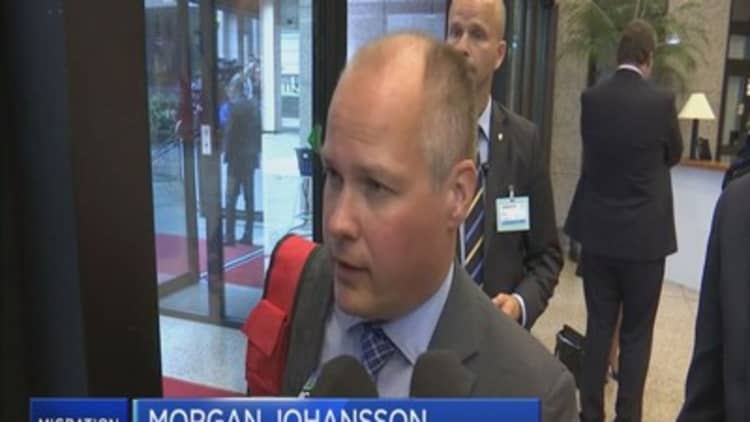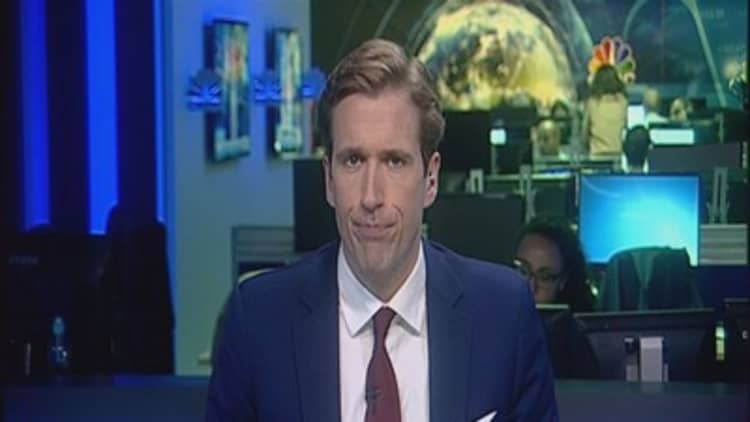Europe's justice and interior ministers unveiled an "emergency" measure to take in an additional 120,000 asylum seekers Monday, after a meeting in Brussels aimed at alleviating the pressure on southern Europe, where migrants tend to arrive from the Middle East.
The agreement, reported by Reuters via the Luxembourg government, reflected one of many proposals for a compulsory quota system to redistribute migrants among the EU, after Germany re-imposed border controls Sunday due to pressure from an influx of thousands of migrants.
Though Europe seems to be rumbling slowly toward a solution, the migrant crisis looks sure to get worse before it gets better. Authorities are struggling to cope with managing large groups of migrants, let alone processing their asylum claims. The crisis has been brewing for a long time, however, with the number of asylum claims in Europe increasing dramatically over the last few years and expected to rise further.
CNBC takes a look at the impact migration could have on Europe's future and on you.
Boost for the labor force?
Supporters of the mass migration say that migrants are a welcome boost for Europe's flagging labor force. In Germany, for instance, there is a high demand for workers trained in mathematics, information technology, natural sciences and technology—or "MINT workers."
According to a report on MINT industries by Institute for Economic Research in Cologne (IW), Germany faces a labor gap and ageing workforce in MINT professions. The institute forecast more demand for more workers in these industries in the future, a demand that it is hoped many of the 800,000 migrants that are expected to arrive in Germany this year alone, could meet.
At the start of September, IW issued a statement urging the German government to facilitate asylum claims from skilled workers and for language and integration courses to enable those workers to enter the German labor force as soon as possible.

A solution for aging Europe?
Hand-in-hand with the labor force debate comes the question of Europe's demographic time bomb that will put pressure on government resources across the region. Ageing populations are squeezing economies as an increasing number of retired workers and elderly citizens look to the state and working people. An increasing labor force (and birth rate) act as a counter-balance.
Germany, Italy and Spain—among Europe's largest economies—have some of the lowest birth rates in the region, according to data from Eurostat. In its latest aging report released in May, the European Commission forecast that Germany's population will shrink from 81.3 million in 2013 to 70.8 million in 2060, so it could do well to accept migrants of working age.
Read MoreMigrants could help solve Europe's aging problem
Last week, the country's Vice-Chancellor Sigmar Gabriel said his country could deal with 500,000 migrants a year "for several years." However, after 13,000 new migrants arrived in Munich on Saturday, Gabriel seemed to change his tune, saying the country was "at the limit of its capabilities." Train routes between Austria and Germany were suspended as a result in a bid to stem the amount of people heading north.

Pressure on economies
While migrants could help boost the labor force, there are fears among more cautious observers of the migrant crisis in Europe that many migrants arriving from the Middle East and Africa are not skilled or educated, and therefore could be burden on state's pressed public finances.
Indeed, the countries where migrants have tended to arrive, often after perilous journeys across the Mediterranean, are recession-hit Greece and Italy, which has only pulled out of a long period of no growth.
Anti-immigration groups claim that an influx of migrants will put further pressure on public services such as healthcare, housing and education systems. Others argue that net migration (immigration minus emigration) tends to offer more benefits than disadvantages with higher tax receipts from working immigrants.
Read MoreIslamic State the top threat in migrant crisis: Czech FinMin
More prosperous countries in Europe, like Germany, are the most attractive to migrants but even though these countries could cope with more people to meet a demand for workers, its latest moves to close its borders show it doesn't want too many.
Interior Minister Thomas de Maiziere told German newspaper Taggespiegel on Saturday that if refugees want protection from Europe, they must accept that they cannot choose which country they live in. 'There can be no free choice of residence for refugees. That doesn't exist anywhere in the world,' he said.

Anti-immigration sentiment
Anti-immigration sentiment has risen across Europe in recent years, with political parties such as the U.K. Independence Party (UKIP) and Alternative for Deutschland (AfD) and France's National Front shooting up the polls.
The current migrant crisis in Europe has divided public opinion with many former opponents to migration changing their minds after seeing harrowing images in the media of children and adults who have died on their way to Europe.
Read MoreThe UK shouldn't take more migrants: Farage
The head of UKIP, Nigel Farage, heckled the leader of the European Commission, Jean-Clauide Juncker, last week when he announced a compulsory quota plan to relocate migrants already in Europe, calling it a "huge mistake." Despite vocal opposition to migration, momentum has gained behind a #migrantswelcome hashtag on social media site Twitter and thousands of Europeans have rallied to meet and embrace those arriving in their towns and cities.

- By CNBC's Holly Ellyatt, follow her on Twitter @HollyEllyatt. Follow us on Twitter: @CNBCWorld


